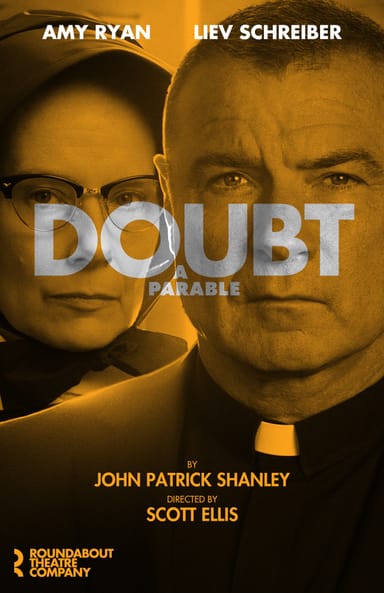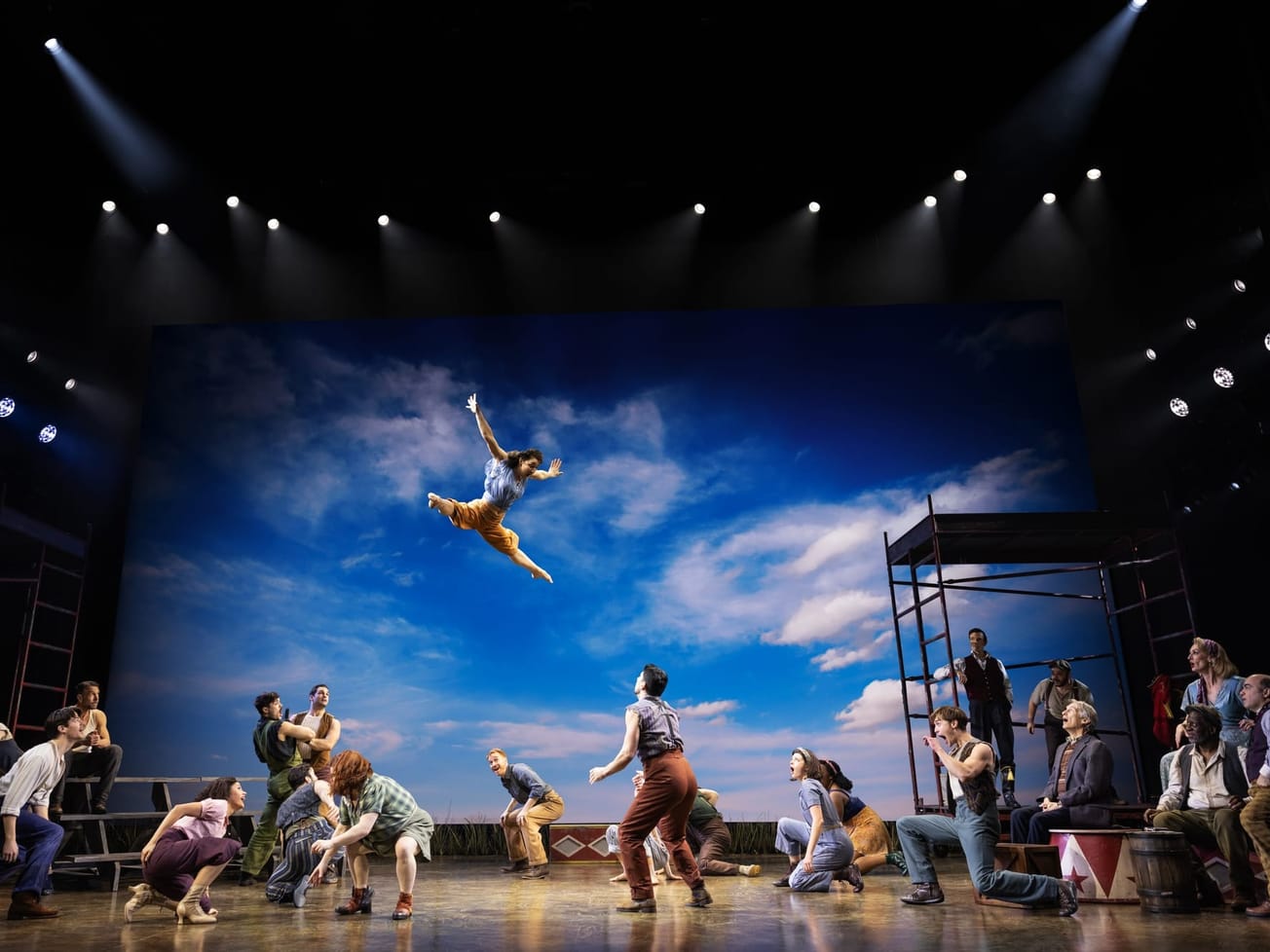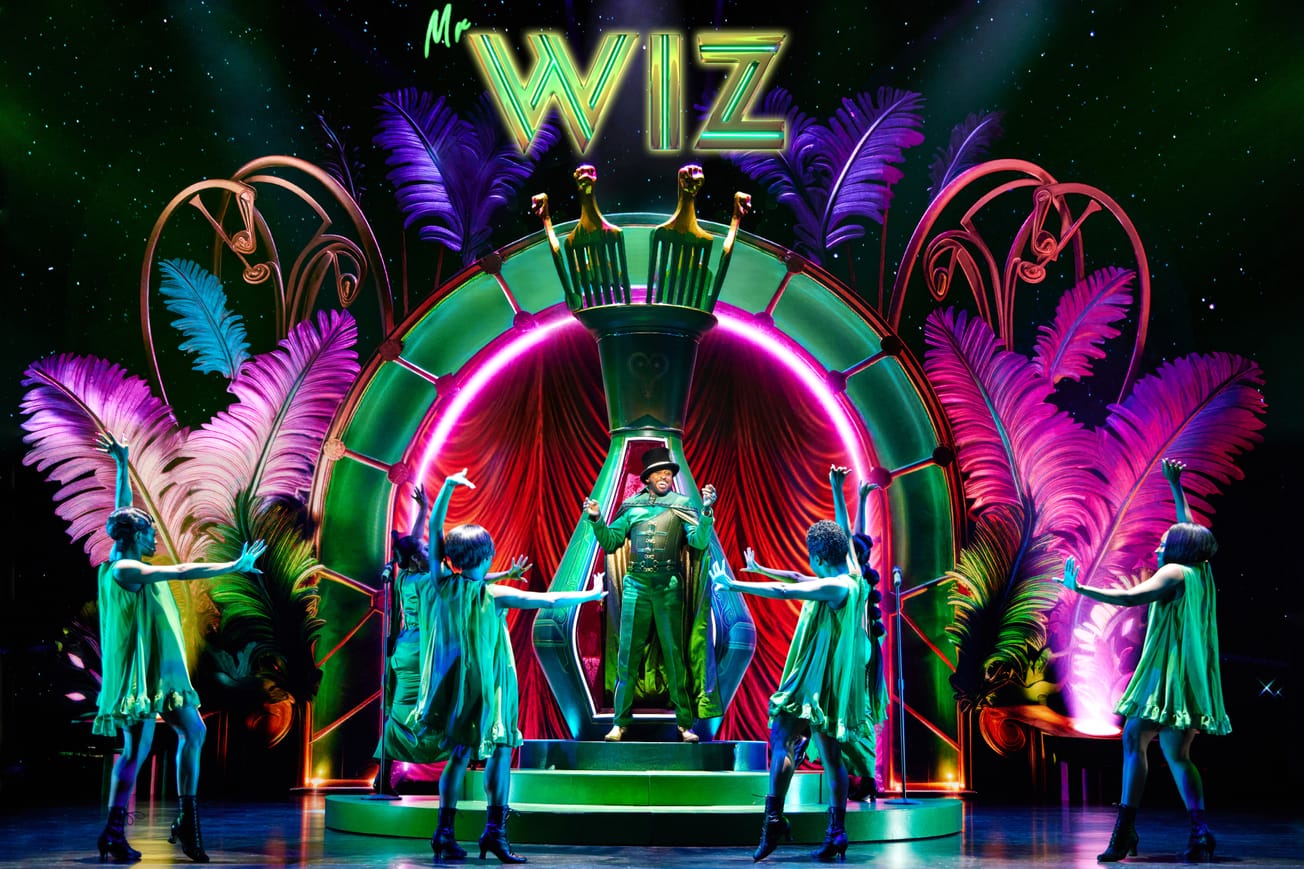Judith Light said it best just before she presented the second Tony Award of the night: “We’re finally home!” Every single person — from the carpet to the broadcast to the winners circle — was ecstatic to be back at Radio City Music Hall to celebrate the 75th Annual Tony Awards.
Walking the Carpet
The red (well, silver) carpet was abuzz with the energy of homecoming. “We do it for the passion and the love, and we’ve been doing it since we were teenagers, and we can’t stop,” said presenter and “Freestyle Love Supreme” alum Utkarsh Ambudkar about the Tonys feeling different than any other awards.
Does the homecoming mean Broadway is healthy? That the industry is in a good place? “It’s hard to tell exactly where we are,” said Manhattan Theatre Club Artistic Director Lynne Meadow of the nonprofit. “We know that audiences want to come back. We know there’s a lot of trepidation; we also know there’s a lot of excitement. We just know that we saw audiences getting more and more comfortable coming back and we just hope it continues.”
“It’s a good sign,” said American Theatre Wing chair and 2022 Tony-nominated costume designer Emilio Sosa of the evening’s scale. “The fact that we’re able to be here tonight in a safe environment and celebrate all of our collective work is a wonderful, beautiful, humbling achievement for the community that — for two years — was rattled to the bone.”
“I love where we [as an industry] are,” said Tony-winning director Kenny Leon, “because at every time in life, there’s a challenge. It just shows you how resilient the human spirit is. Evil can’t stop us, disease can’t stop us. We still have a need to gather to share stories. It’s evident every time I walk into a Broadway theater.”
Leon also broke news that he will be directing three shows next season: Suzan-Lori Parks’ Pulitzer Prize winner “Topdog/Underdog” in the fall (“It’s the 20-year anniversary of that,” Leon said, referring to its 2002 Pulitzer win), as well as two shows produced by Jeffrey Richards, “The Ohio State Murders” by Adrienne Kennedy starring Audra McDonald and a new play, “A Non-Confederate Romp Through the Cotton Patch” (“We’re going to keep [the author] under the wraps,” said Richards, “but you’ll find out soon enough”).
This bodes well for the continuation of telling diverse stories. “It takes all of us,” said Leon. “It takes every part of this industry. The fact that we’re naming some of the theaters after African-Americans, that’s a huge thing. When an-eight-year-old Black girl can look up and say, ‘Oh, Mommy, Lena Horne.’ And then you go home and talk about that. Or James Earl Jones. The musical I’m doing in Atlanta, ‘Trading Places,’ I reimagine that musical [a new adaptation of the film] and put a Black woman at the center of that story so the musical becomes about if we were to actually trade places with each other for five minutes, wouldn’t we be better?”
To the Media Room: Beaming with Pride
Taking new perspectives could be a key to success. The first win of the night — Best Original Score — went to “SIX,” which tells the story of Henry VIII’s wives in their (typically) unheard voices. The win for co-writers Lucy Moss and Toby Marlow also upended the history books, as Marlow became the first-ever non-cisgender winner of a Tony Award. In the media room, Marlow (who identifies as nonbinary) remarked breathlessly, “It feels really amazing to be part of a season where there is so much queerness onstage, explicitly. Queerness in the actors, in the creators. It feels really wonderful. I hope with more queer people storming Broadway in new and different ways that it will be reflected more and more and more in the shows we’re watching.”
Marlow and Moss also revealed that they are working on a new musical and the score for an animated film, and Marlow is in pursuit of their dream of becoming a legitimate recording artist. “First was this,” Marlow said, holding up their statue. “Next? Pop star.”
Jesse Tyler Ferguson, who won for his turn as a gay business manager in Second Stage’s revival of “Take Me Out,” also remarked on the significance of winning for Richard Greenberg’s work, which spotlights the stories of two gay men. “I saw this play as a young gay man 20 years ago and it meant so much to me,” Ferguson said in the media room. “To know that there’s a whole new group of people — a new group of kids! — that are a part of that community seeing Mason Marzac and falling in love with him is really profound.”
The Revivalists
A few winners later, the entire “Take Me Out” team and their “coach” (director Scott Ellis) hopped up on the stage of the media room and the first question actually came from star Jesse Williams: “Those sandwiches look good. Are there sandwiches here?” he asked, eyeing the press’ dinner. Hunger aside, what shined through most in their press-room gathering was the love that this company has for one another. “[There’s] a lot of joy backstage,” said Williams. “It’s like a clubhouse, it’s like a dugout.” Fellow nominee Michael Oberholzter added, “We wait in the wings. We watch each other. I’ve watched [Ferguson’s monologue] I don’t know how many times. The best thing we do is support each other backstage.”
“Especially this last week,” Williams jumped in again. “You would just see us gather in the wings watching Jesse’s speech, watching everybody work. All sitting on the floor, legs crossed like little kids just watching each other’s work with a ton of admiration and respect.”
Also in revival land, “Company” won big: Best Scenic Design of a Musical for Bunny Christie, Featured Actress in a Musical for Patti LuPone, Featured Actor in a Musical for Matt Doyle, Direction of a Musical for Marianne Elliott and Revival of a Musical for the production itself.
The winners were full of revelations. Christie shared that before the set was a construct of boxes — before the foundational “Alice in Wonderland” concept for the musical had come to the fore — the thrust of the design was actually a complicated turntable “because of the whole clock ticking and time moving,” said Christie. While that decision was made the night before the design was due for approval, the decision to change Amy to Jamie (Doyle’s role) was a long, difficult one. “[Sondheim] was very resistant to it at first and I know Marianne also felt that in a really beautifully feminist production we shouldn’t lose another female role, a classic female role. There has to be a reason behind it,” newly minted Tony winner Doyle told the press. “Once Stephen really understood the reason behind this new anxiety around gay marriage and what that means for a culture that’s never had that right before and how we fit into that culture and how we fit into this heteronormative institution — that was an idea that needed to be explored.”
Elliott’s efforts for the full exploration of the piece were rewarded when she won her third Tony Award as director. In fact, Elliott is now the only woman to ever win three (beating her own record as the first woman to win two) and the only woman to win a Tony for Best Direction of a Play (for “War Horse” and “Curious Incident”) and Best Direction of a Musical. “It’s overwhelming, really, to be honest. I really never imagined I’d ever do a show on Broadway,” she said. “I’ve always struggled with insecurities and vulnerabilities and I never imagined I would be a director because I thought all directors were men — which they were when I first started out. So I suppose it just shows you just have to keep going and maybe eventually you’ll get a job.”
“Company” producer Chris Harper was also in great spirits. He had been name-checked throughout the night as the man who pays everyone’s salary on the Sondheim revival, thanks to a viral video of star and now three-time Tony winner LuPone. “I have to say, you don’t see that coming, do you?” Harper admitted, regarding the video. “The great thing about Patti is you never know what is going to happen. I love her so completely and deeply. She’s truly a legend.”
With Reverence
Legends were on the mind of Joaquina Kalukango, who won Leading Actress in a Musical for “Paradise Square” and accepted her trophy from her former “Color Purple” co-stars Danielle Brooks and Cynthia Erivo. “These [two] women have literally spoken life into me so many times. So, there are no words. I just keep thinking of the women who came before me. I keep thinking of Melba Moore. I keep thinking of Jennifer Holliday. I keep thinking of Pearl Bailey. I think of all these women who paved the way. I’m even thinking of Phylicia Rashad,” she said. “It’s an honor to be a part of the community.”
For Rashad herself, who won Featured Actress in a Play (for “Skeleton Crew”), she thought of the Detroit auto-factory workers she honored through her onstage character, Faye. “Every single thing we touch every single day are the fruits of someone’s labor, but we don’t think about that. We don’t think about those people,” Rashad said. “Acting is a very compassionate art and oftentimes when we’re beginning as actors, when we’re studying, the thought is to ‘show someone what you can do,’ but that isn’t what acting is at all. Acting is understanding — understanding another human being and embodying that.” The iconic actress honored essential workers through her compassionate portrayal of one.
The History Books
For those keeping track of icons and records broken, in addition to Marlow and Elliott’s historic wins, 22-year-old Myles Frost is now the youngest solo winner for Best Leading Actor in a Musical, beating Ben Platt’s record set in 2017 with “Dear Evan Hansen.” Frost, who won for his portrayal of Michael Jackson in “MJ,” told the media, “It’s an incredible honor. I’m so blessed to hold that mantle. I came into this very green to show that even someone coming in as new as myself can come in and learn the true essence of Broadway and the true essence of theater and make a huge impact.”
Unexpectedly, actress and singer Jennifer Hudson hit a major milestone as she became the 17th person to reach coveted EGOT status (winning an Emmy, Grammy, Oscar and Tony). She won her Tony as part of the producing team of “A Strange Loop,” completing her quartet of honors.
Another momentous impact: the Best Play win for “The Lehman Trilogy.” This marked four years in a row that overseas productions have earned the award; the streak marks a new record. “I think it’s testimony to the power of subsidized theater in Britain,” said Ben Power, who adapted Stefano Massini’s novel into the Tony-winning play. “You have not-for-profits in this country — ‘Strange Loop’ just won Best Musical coming from a nonprofit. All that artists get outside the commercial theater leads to building of shows that then can become really successful within the commercial theater.” That said, artistic director of London’s National Theatre Rufus Norris noted that there is an exchange between Broadway and the U.K., specifically. “American drama in London, in particular, is really, really highly regarded,” Norris said. “A lot of new plays that come out of New York do fantastically. So it’s quite interesting…there’s no shortage of great [work].”
Speaking of nonprofits and plays, the “Take Me Out” Best Revival trophy marked a historic first for Second Stage Theater, which began producing on Broadway only four years ago.
The Kind of Art to Make
“We’re in a time where it’s possible to really push theater forward,” said Deirdre O’Connell, who won Leading Actress in a Play for the unusual theatrical work “Dana H.” Adapted from voice recordings of playwright Lucas Hnath’s mother recounting her time as the victim of an adult kidnapping and abuse, Hnath’s play allows his mother to speak in her own words as O’Connell embodies her onstage, but mouths the spoken dialogue. “The fact that I got this shiny, shiny symbol on this shiny day says, ‘Yes, we should make the personal art. We should make stuff that you’re not sure how to make.’”
“Even when I felt most alone, I was always fearless about art,” said “A Strange Loop” creator Michael R. Jackson, who won Best Book of a Musical. “What I’m hoping is that this will show young artists, young writers, young actors, everybody who’s in theater that maybe they’ll feel a little less afraid to be weird and to step out and to try something different and try something new and that producers will encourage them and support them and give them the resources they need.”
That also requires producers to be fearless, which “Strange Loop” lead producer Barbara Whitman displayed. “The last musical I did was ‘Fun Home’ and it gave me the courage to do ‘Strange Loop,’” she said. “As a producer, the more you can make it happen and the more it works, the more it gives you the courage to try again with something that might be even risky or more unusual.” It also means trusting the path of your show.
“I never believed it would be commercial,” Whitman confessed. “I thought we’d do it off-Broadway and that was all we thought we’d do. The show just took off in all the most beautiful ways. We never led the show; the show led us.”
This season was one of risk, which led to an incredible range in storytelling. The variety originally reflected in the nominations also shone in the winners. Eleven productions of the 29 nominated won Tony Awards — the most trophies going to “Lehman Trilogy” and “Company” with five each. The youngest solo winner took home the statue for Leading Actor in a Musical (Frost) while a Broadway veteran won Featured Actor in a Play (Ferguson). A legit pop sound won for Best Original Score (“SIX”) while a classical epic out of Britain won Best Play (“Lehman”). A performer who lip-synched an entire solo show won Leading Actress in a Play (O’Connell) and a musical that never intended to make it to Broadway won Best Musical (“A Strange Loop”). Broadway’s homecoming doesn’t seem to be a return to theater produced before the shutdown; it seems like a renaissance.
As Jackson said: “The world is so crazy and it can be so narrow and so conservative that I’m like, ‘Art is like the place where we can do literally anything, so let’s do anything!’”






















































